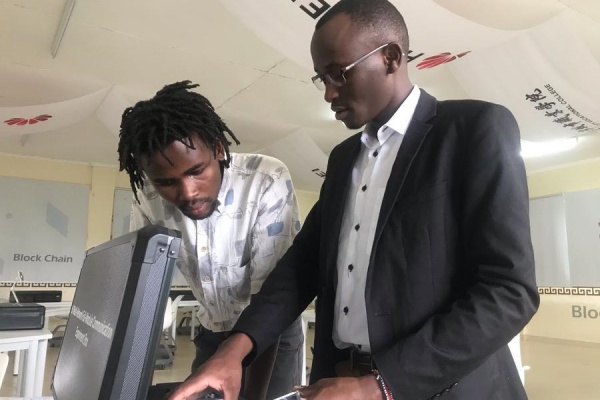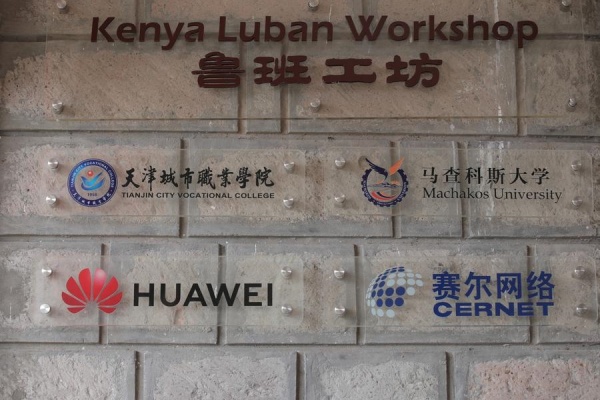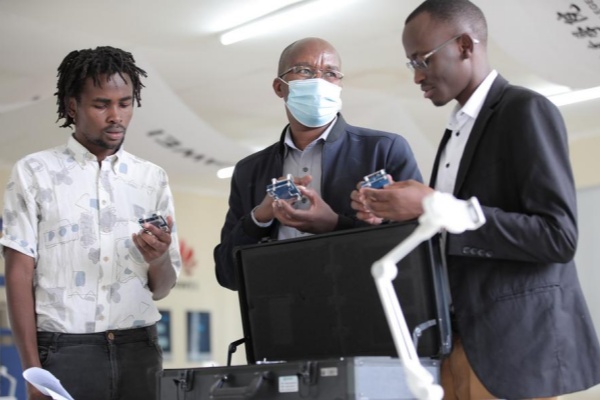
- Home
- Media Center
-
Events
- Wuzhen Summit
- Regional Forums
- Practice Cases of Jointly Building a Community with a Shared Future in Cyberspace
- World Internet Conference Awards for Pioneering Science and Technology
- The Light of Internet Expo
- Straight to Wuzhen Competition
- Global Youth Leadership Program
- WIC Distinguished Contribution Award
- Membership
- Research & Cooperation
- Digital Academy
-
Reports
- Collection of cases on Jointly Building a Community with a Shared Future in Cyberspace
- Collection of Shortlisted Achievements of World Internet Conference Awards for Pioneering Science and Technology
- Reports on Artificial Intelligence
- Reports on Cross — Border Ecommerce
- Reports on Data
- Outcomes of Think Tank Cooperation Program
- Series on Sovereignty in Cyberspace Theory and Practice
- Other Achievements
- About WIC
- 中文 | EN

Kenyan universities embrace Chinese Luban Workshop to equip students with modern skills

The file photo shows Machakos University students Peter Kariuki (R) and Owen Alikula (L) demonstrating how to set up Wi-Fi and Bluetooth networks at the institution's Luban Workshop in Machakos, Kenya, May 19, 2021. (Photo/Xinhua)
Luban Workshop, an international vocational education project, has been established in Kenyan universities since 2019, aiming to equip students with modern computing knowledge.
NAIROBI -- Inside a workshop at Machakos University, southeast of the Kenyan capital of Nairobi, students sit in groups of six, guided on how to join different computer parts.
In one group, a young instructor picks up a computer chip and explains how it is linked to other components. The students listen attentively. In another section of the workshop, the other instructor holds a computer chip and a USB cable, explaining their functions to his group.
The workshop, named Luban, is one of the most popular establishments at the institution, with tens of students visiting daily for lessons. Machakos University established the Luban Workshop in 2019 with support from Chinese technology giant Huawei and Tianjin City Vocational College (TCVC).

The file photo, taken on May 19, 2021, shows the Luban workshop plaque at Machakos University in Machakos, Kenya, May 19, 2021. (Photo/Xinhua)
It was the first Luban Workshop at a Kenyan university, aiming to equip students with innovative digital technology skills such as artificial intelligence (AI), cloud computing, big data and the Internet of Things.
Since then, Luban workshops have been established at several other institutions of higher learning across Kenya, including Meru University of Science and Technology and Taita Taveta University. These universities leverage the Luban workshops to equip students with modern computing knowledge.
Eric Omuya, chairman of the Computing Department at Machakos University, said the Luban Workshop caters to students from various courses.
The university operates Google Developers Club, Innovation Club and Science Club, which bring together students who utilize the workshop's resources. "The workshop has a capacity of 100 people and can run two classes concurrently," Omuya added.
Peter Musyoka, a third-year economics student at the university, credits the Luban Workshop for sparking his interest in computing, especially emerging technologies like AI and big data. "Thanks to the workshop, I now understand how I can apply technologies like AI in my field of study," he said.

The file photo shows Charles Mwaniki (C), dean of the School of Engineering and Technology at Machakos University, demonstrating how to set up Wi-Fi and Bluetooth networks to students Peter Kariuki (R) and Owen Alikula (L) at the institution's Luban Workshop in Machakos, Kenya, May 19, 2021. (Photo/Xinhua)
At Taita Taveta University, the Luban Workshop focuses on petroleum and petrochemical engineering. Opened in 2021, it trains oil and gas specialists from Kenya and neighboring countries, according to the university. "Some of our lecturers have already been trained in China, and others are undergoing training," said Vice Chancellor Fred Barasa during the launch three years ago.
The Luban Workshop at Meru University of Science and Technology was launched in September 2023, through a partnership with TCVC. It features vocational education and Silk Road e-commerce centers, each designed to empower students and professionals with practical skills and knowledge aligned with the demands of modern jobs.
During the launch, TCVC's Deputy Vice Chancellor Liu Sheng said the programs offered at the workshop equip learners with the skills and knowledge required for the dynamic job market, fostering knowledge exchange and cultural understanding between Kenya and China.
The Luban Workshop, named after the ancient Chinese craftsman Lu Ban, is an international vocational education project offering the latest AI, big data and cloud computing courses to Kenyan students.
Henry Wandera, an economics lecturer in Nairobi, said the workshops help strengthen Kenya-China ties and support economic growth by creating a more skilled workforce. "Skilled workers create new businesses, improve productivity, and attract foreign investment. Luban Workshop is part of China's path to economic success. By embracing them, Kenya is on the right track," he said.

The World Internet Conference (WIC) was established as an international organization on July 12, 2022, headquartered in Beijing, China. It was jointly initiated by Global System for Mobile Communication Association (GSMA), National Computer Network Emergency Response Technical Team/Coordination Center of China (CNCERT), China Internet Network Information Center (CNNIC), Alibaba Group, Tencent, and Zhijiang Lab.





